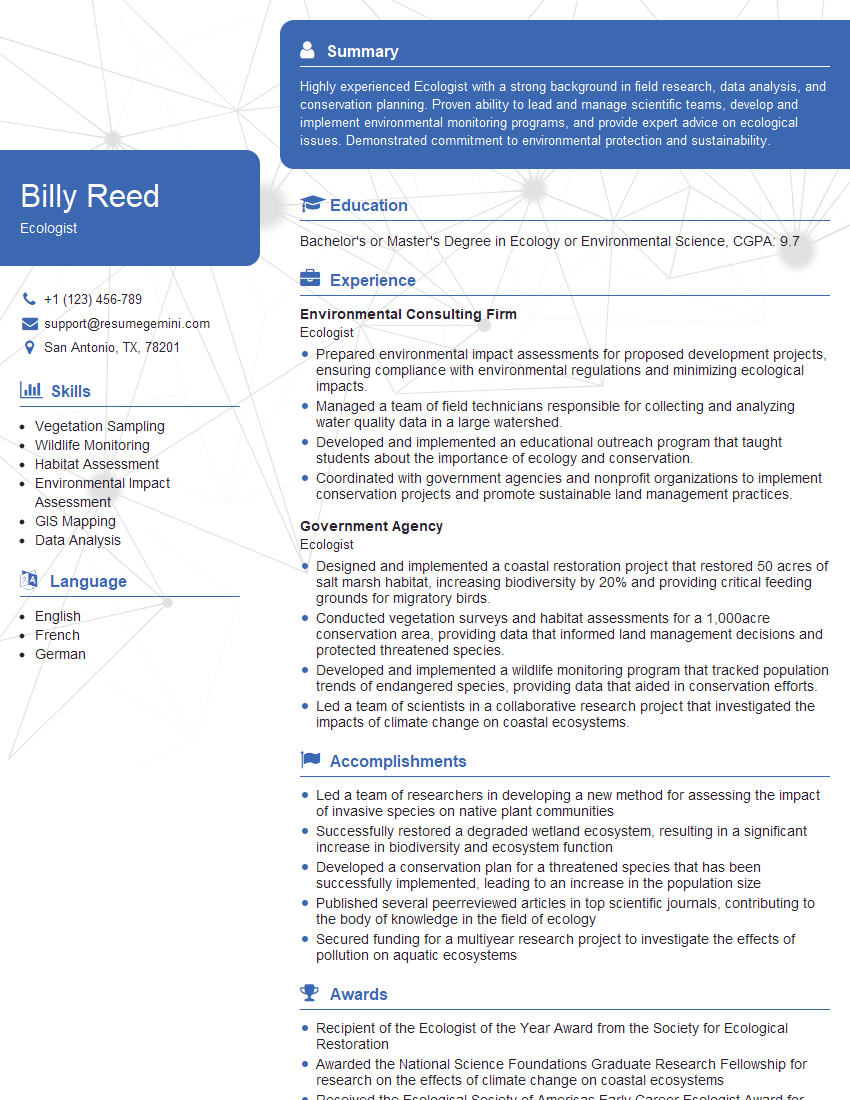Are you a seasoned Ecologist seeking a new career path? Discover our professionally built Ecologist Resume Template. This time-saving tool provides a solid foundation for your job search. Simply click “Edit Resume” to customize it with your unique experiences and achievements. Customize fonts and colors to match your personal style and increase your chances of landing your dream job. Explore more Resume Templates for additional options.

Billy Reed
Ecologist
Summary
Highly experienced Ecologist with a strong background in field research, data analysis, and conservation planning. Proven ability to lead and manage scientific teams, develop and implement environmental monitoring programs, and provide expert advice on ecological issues. Demonstrated commitment to environmental protection and sustainability.
Education
Bachelor’s or Master’s Degree in Ecology or Environmental Science
January 2018
Skills
- Vegetation Sampling
- Wildlife Monitoring
- Habitat Assessment
- Environmental Impact Assessment
- GIS Mapping
- Data Analysis
Work Experience
Ecologist
- Prepared environmental impact assessments for proposed development projects, ensuring compliance with environmental regulations and minimizing ecological impacts.
- Managed a team of field technicians responsible for collecting and analyzing water quality data in a large watershed.
- Developed and implemented an educational outreach program that taught students about the importance of ecology and conservation.
- Coordinated with government agencies and nonprofit organizations to implement conservation projects and promote sustainable land management practices.
Ecologist
- Designed and implemented a coastal restoration project that restored 50 acres of salt marsh habitat, increasing biodiversity by 20% and providing critical feeding grounds for migratory birds.
- Conducted vegetation surveys and habitat assessments for a 1,000acre conservation area, providing data that informed land management decisions and protected threatened species.
- Developed and implemented a wildlife monitoring program that tracked population trends of endangered species, providing data that aided in conservation efforts.
- Led a team of scientists in a collaborative research project that investigated the impacts of climate change on coastal ecosystems.
Accomplishments
- Led a team of researchers in developing a new method for assessing the impact of invasive species on native plant communities
- Successfully restored a degraded wetland ecosystem, resulting in a significant increase in biodiversity and ecosystem function
- Developed a conservation plan for a threatened species that has been successfully implemented, leading to an increase in the population size
- Published several peerreviewed articles in top scientific journals, contributing to the body of knowledge in the field of ecology
- Secured funding for a multiyear research project to investigate the effects of pollution on aquatic ecosystems
Awards
- Recipient of the Ecologist of the Year Award from the Society for Ecological Restoration
- Awarded the National Science Foundations Graduate Research Fellowship for research on the effects of climate change on coastal ecosystems
- Received the Ecological Society of Americas Early Career Ecologist Award for outstanding research contributions to the field of conservation biology
Certificates
- Certified Wildlife Biologist
- Professional Wetland Scientist
- Certified Environmental Manager
- Certified Ecologist
Career Expert Tips:
- Select the ideal resume template to showcase your professional experience effectively.
- Master the art of resume writing to highlight your unique qualifications and achievements.
- Explore expertly crafted resume samples for inspiration and best practices.
- Build your best resume for free this new year with ResumeGemini. Enjoy exclusive discounts on ATS optimized resume templates.
How To Write Resume For Ecologist
- Highlight your quantitative skills and experience with data analysis and scientific modeling.
- Showcase your ability to work independently and as part of a team, and to manage multiple projects simultaneously.
- Demonstrate your understanding of ecological principles and your passion for environmental conservation.
- Tailor your resume to each specific job you apply for, highlighting the skills and experience most relevant to the position.
Essential Experience Highlights for a Strong Ecologist Resume
- Conduct field surveys and collect data on plant, animal, and habitat characteristics.
- Analyze data to assess the health and status of ecosystems, identify trends, and develop conservation strategies.
- Design and implement restoration and conservation projects to protect and enhance ecological integrity.
- Write scientific reports, grant proposals, and other technical documents related to ecology and conservation.
- Communicate complex scientific concepts to stakeholders, including government agencies, non-profit organizations, and the general public.
- Collaborate with other scientists, researchers, and resource managers to advance understanding and protect ecological systems.
Frequently Asked Questions (FAQ’s) For Ecologist
What is the job outlook for Ecologists?
The job outlook for Ecologists is expected to be excellent, with a projected 8% growth in employment from 2019 to 2029.
What are the typical salary ranges for Ecologists?
The typical salary range for Ecologists varies depending on experience, education, and location, but can range from $40,000 to $100,000 per year.
What are the most important skills for Ecologists?
The most important skills for Ecologists include strong field research skills, data analysis skills, and knowledge of ecological principles. Communication skills and the ability to work independently and as part of a team are also important.
What are the most common work environments for Ecologists?
Ecologists typically work in outdoor settings, such as forests, wetlands, or coastal areas. They may also work in laboratories or offices, analyzing data or writing reports.
What are the career advancement opportunities for Ecologists?
Ecologists can advance their careers by gaining experience, earning higher degrees, and taking on leadership roles. They may also specialize in a particular area of ecology, such as conservation biology or wildlife management.